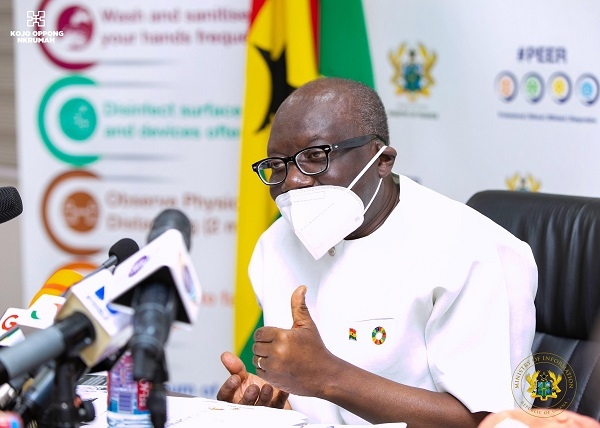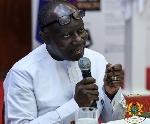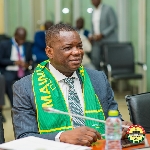Ofori-Atta asks IFC to increase private sector funding
 Finance Minister Ken Ofori-Atta
Finance Minister Ken Ofori-Atta
The Minister of Finance, Mr Ken Ofori-Atta, who made the call, also asked the corporation to raise the level of investment committed into core sectors of the economy, such as manufacturing, agribusiness, financial markets and housing.
The minister made the call in Accra yesterday when he opened a two-day strategy retreat between the government and the IFC, a member of the World Bank Group (WBG) with focus on funding private enterprises.
The retreat will enable the government and the IFC to look at ways to align the government’s post-COVID-19 response plan with the IFC’s country strategy.
Mr Ofori-Atta said the increment in the amount invested per firm was needed to raise critical enterprises to drive sustained transformation in the economy.
He said the devastating effects of the COVID-19 on the local economy required that global bodies, such as the IFC, refocus their support to help revive the economy and protect livelihoods.
Given that key sectors such as manufacturing, housing and agribusiness had the potential to increase exports and expand job creation, the minister said, increased investments in enterprises operating in such sectors would help accelerate economic growth and development.
Urgency
Mr Ofori-Atta noted that the fallouts from the pandemic had opened an era of profound urgency for economic transformation in Ghana, and that Ghana now needed to readjust to be able to confront the uncertain times.
He said it was on the basis of the challenges posed by the COVID-19 pandemic that President Nana Addo Dankwa Akufo-Addo directed the ministry to lead the development of a response and recovery programme.
“The GH¢100 billion Ghana COVID-19 Alleviation and Revitalisation of Enterprises Support (CARES) ‘Obaatan pa’ programme, of which GH¢70 billion is expected from the private sector, is the outcome which enables us to respond effectively to this pandemic and beyond.
“This is consistent with our resolve to create the most business-friendly and people-centred economy in the African region,” the finance minister said.
“We do this, knowing that the private sector sparks the innovation necessary for Ghana to thrive; delivering close to 90 per cent of the jobs (of which about 80 per cent are from the informal sector), and most of the goods and services needed,” Mr Ofori-Atta added.
He said the CARES ‘Obaatan pa’ programme provided a mechanism to attract higher levels of private investment into the most productive sectors to create a dynamic national and regional economy.
Increased investments
The minister said the goals of the programme, coupled with the renewed sense of urgency to address challenges that had been amplified by the pandemic, required that the government and its partners become more inventive and embrace all actors.
“It requires that we expand and deepen our financial and investment partnerships and increase knowledge sharing to fuel and lubricate the engine of growth – the private sector. It is in this light that we are seeking to re-set and strengthen our partnership with the IFC – a partner with considerable capital, expertise, and influence to create markets and opportunities,” Mr Ofori-Atta said.
“Indeed, the IFC has a history in Ghana. It committed in excess of US$4.3 billion to support the private sector between 2008 and 2018,” he added.
The finance minister said recent developments required that the IFC use its unique character to expand and achieve inclusive private sector development by making investments that expanded opportunities, helping businesses improve standards and establishing business-enabling systems that promoted prosperity.
Consequently, he said, Ghana would be seeking to strengthen its partnership with the IFC to enable the government to provide decent jobs for the youth and improve the livelihoods of the people.
He said the partnership must be repositioned to optimise the potential of the over 8.5 million Ghanaian youth, aged between 15 and 34 years, for economic transformation.
Commendable efforts
The Vice-President of the IFC for Middle East and Africa (MEA), Mr Sérgio Pimenta, commended Ghana for the admirable efforts to manage the pandemic and the economy.
That, he said, had resulted in the economy growing at 0.4 per cent last year, at a time when most economies had contracted.
Mr Pimenta said he was reassured to see that the government had put in place a clear plan for economic recovery, even before most vaccines were announced.
“That shows Ghana knows where it wants to go. For us at the IFC, such a clear vision makes it easier for us to come in as a partner to support your efforts to power the private sector to drive the recovery,” he said.
He said the workshop was historic and timeous, as it provided the corporation the opportunity to go deeper into the Ghana CARES plan to understand the government’s top priorities.
Total portfolio
M Pimenta disclosed that Ghana was home to the IFC’s biggest programmes in Africa.
“In the last decade, the IFC has committed about $4 billion to help Ghana improve health care, provide energy, unlock its natural resources, expand trade, leverage the new digital economy and finance micro, small and medium enterprises (MSMEs). Our current portfolio in Ghana is nearly $2 billion,” he added.
Source: Graphic.com.gh
Trending News

Weija Water Treatment Plant to shut down for scheduled maintenance today Dec. 19
07:07
60 lives lost at Madina Zongo junction as pedestrians ignore footbridge-MCE
07:10
Bawku report submitted; Mahama to respond within 24 hours
20:25
NDC confident ahead of December 30 Kpandai rerun
07:27
Part (3) of many: Why US not likely to extradite Ken Ofori-Atta despite A-G's request
07:56
Accra–Kumasi Expressway to offer alternative route, not replace existing highway – Roads Minister
06:55
Mind your words on Bawku — Otumfuo advises Cletus Avoka
19:11
Ghana launches blue economy strategy to boost national development
07:25
Kennedy Agyapong vs Atta Akyea: Alex Tetteh invoke curses on former MP over alleged meeting with Ken
04:07
Trade Minister engages tomato growers and traders to resolve value chain challenges
01:51



